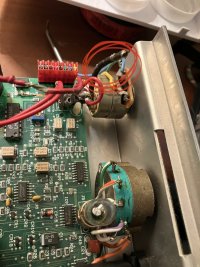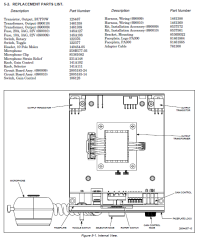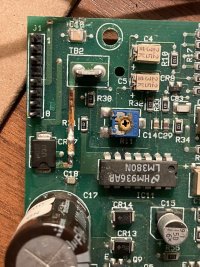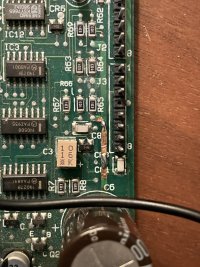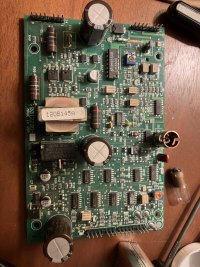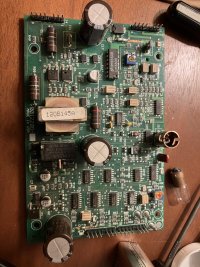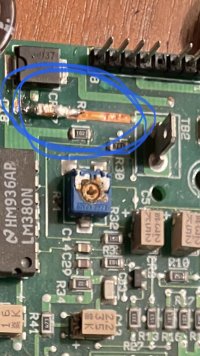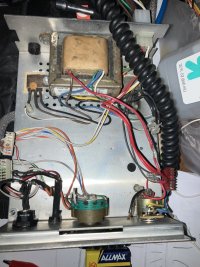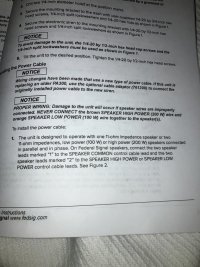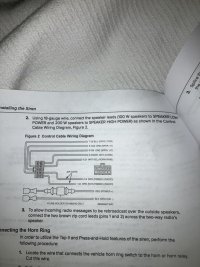Hello all, I am brand new to the forum and also to audio systems and circuitry in general. I recently picked up a “black-faced” federal signal pa300 unit. It is currently not working and I was hoping I could gain some insight and maybe get it working. I cannot find any wiring/circuitry diagrams for it online so I have turned to forums. Currently I am unsure what is working but I have a wire that is cut so I am hoping someone could tell me where it connects(?). It is the black wire that comes off of the gain/off knob.
You are using an out of date browser. It may not display this or other websites correctly.
You should upgrade or use an alternative browser.
You should upgrade or use an alternative browser.
Federal Signal PA300 wiring/circuitry?
- Thread starter 12V71
- Start date
runs to rear molex connector, I believe for Chassis Ground (90% sure)
I am looking through old pictures I have from when I had mine apart to clean it.
If nobody else responds I will pull mine out this weekend and check for certain.
I am looking through old pictures I have from when I had mine apart to clean it.
If nobody else responds I will pull mine out this weekend and check for certain.
Would that black wire have any effect on turning on the unit/it not working? Also could you point out the molex connector, I am unsure what that is. I’ve taken the board out to do a general inspection and it looks pretty good. I’ve had to solder back two connections on the PCB itself. Is it normal for a 363 resistor to show a resistance reading of 17.85 k-ohms? The 473 resistor is showing a reading of 23.7 k-ohms. I noticed in both cases the resistance k-ohms are about half that of the k-ohm resistance rating on the resistor. On a 103 and a 153 I have had success with the 103 reading 9.98 k-ohms and the 153 reading 14.86 k-ohms.
I have been using a 9v battery to power it if it matters (I know it’s supposed to be a 12v system). I have confirmed the light works by testing it separate from the unit. I also ran a parasitic draw test (like what you would do on a car), unsure if this works for something like this but I had a draw of roughly 360mV with the unit off.
Any thoughts? I’m super new to this so please any advice is GREATLY appreciated.
I have been using a 9v battery to power it if it matters (I know it’s supposed to be a 12v system). I have confirmed the light works by testing it separate from the unit. I also ran a parasitic draw test (like what you would do on a car), unsure if this works for something like this but I had a draw of roughly 360mV with the unit off.
Any thoughts? I’m super new to this so please any advice is GREATLY appreciated.
Pictures of the board and my sub-par soldering fixes. I’m unsure if these blew with the previous owner or when I decided to be an idiot and plug the unit directly into a 120v A/C outlet without a fuse. Either way I soldered them back together. Anything else I should check that would have blown that isn’t immediately obvious?
Attachments
I'm sorry, but if you're serious that you hooked this up to 120volts it is likely fried beyond repair.
Emergency equipment typically runs on 12 volts, occasionally 24 and the real old stuff on 6.
Emergency equipment typically runs on 12 volts, occasionally 24 and the real old stuff on 6.
Yes, really. Running 120volts through a board made to handle ~12 will certainly cause lasting damage to the board itself, components and the paths connecting them.Well I should say I had an inverter plugged in but I didn’t have it switched to 12v DC. So it definitely messed with it. Really fully fried? Nothing salvageable? I mean I wouldn’t be surprised if that were the case but I just want to make sure.
I'm not an electrical engineer but I don't know that it would be repairable.
Any potential saving grace would be that the excessive current blasted one of the paths travelled, therefore stopping the flow of current to other components. You would need to determine where that flow stopped, replace anything preceding it and figure out how to reconnect the path.
I'm gonna be honest, unless this PA300 has a unique configuration say NYPD or something, your best bet is to get another.
These are not real expensive (currently) and there are plenty out there. There are users on here who repair sirens, but if you exposed this to 120V AC and the device was intended to run 12VDC there is probably extensive damage that might not be worth saving.
I see this happen with Pachislo (slot machines) that I work on.. they are to be run on 24V AC and people plug them into 120V AC and its game over.. literally.
These are not real expensive (currently) and there are plenty out there. There are users on here who repair sirens, but if you exposed this to 120V AC and the device was intended to run 12VDC there is probably extensive damage that might not be worth saving.
I see this happen with Pachislo (slot machines) that I work on.. they are to be run on 24V AC and people plug them into 120V AC and its game over.. literally.
Well I’m looking through the damage now. It looks like one of the transistor and the capacitor that sits on it is blown and the wire running from the battery + to all the PCB components is also blown. It seems like there is a chance it blew before it made it to the other components.
Regardless, where is the best place to look for these units? eBay is not so good anymore.
Regardless, where is the best place to look for these units? eBay is not so good anymore.
From the Installation guide..I’ve found another one online for not too much. I’ve got it ordered. In the meantime can anyone tell me the best way to wire this in a car and the necessary fuses?
PROPER FUSING: To avoid damage to unit, ensure that it is properly fused, with an 20 A
in-line fuse and fuseholder installed in the red power cable lead.
I am attaching the installation manual from Federal. Read through it before you begin tinkering.
Rob
Attachments
Burned down my first few cars but then got it mastered after the art of the fuse and correct wire sizing.
Has anyone mentioned that a 100w speaker is required in order for the siren to operate (be heard)?
its also supports a 58w speaker as per the manual.. I decided to read itHas anyone mentioned that a 100w speaker is required in order for the siren to operate (be heard)?
The PA300 has been in production for forty years. There have been some changes to the circuitry, but the most notable difference is a change in the wail tone over time. Early PA300s (silver face and early black face) have a distinctive slow rising wail tone. Later versions have a faster rising wail tone.I'm gonna be honest, unless this PA300 has a unique configuration say NYPD or something, your best bet is to get another.
These are not real expensive (currently) and there are plenty out there.
Thank you for the manual, I'll be sure to read it this time  . Question regarding the speaker. Since I have no idea what I'm doing, I am going to ask stupid questions. The place I bought the new PA300 from (which arrives later today), has a description for the item online. It says it's a functioning unit that is 12V 200 watts unit. I have a BP100 (100 watt) speaker that I want to use, is this correct (or is there some 100 watt PA300 that I need that I am unaware of)???? In other words, will I damage the speaker with this 200 watt PA300 on a 100 watt speaker? Thanks for bearing with my stupidity.
. Question regarding the speaker. Since I have no idea what I'm doing, I am going to ask stupid questions. The place I bought the new PA300 from (which arrives later today), has a description for the item online. It says it's a functioning unit that is 12V 200 watts unit. I have a BP100 (100 watt) speaker that I want to use, is this correct (or is there some 100 watt PA300 that I need that I am unaware of)???? In other words, will I damage the speaker with this 200 watt PA300 on a 100 watt speaker? Thanks for bearing with my stupidity.
Also I am guessing this is unnecessary but should I run a fuse in the speaker wires too? And I have touched the speaker wires to a 9v battery with the wires in either configuration on the terminals and I hear noise either way. Will it matter which orientation they connect to on the PA300?
Thank you for bearing with my ignorance.
Also I am guessing this is unnecessary but should I run a fuse in the speaker wires too? And I have touched the speaker wires to a 9v battery with the wires in either configuration on the terminals and I hear noise either way. Will it matter which orientation they connect to on the PA300?
Thank you for bearing with my ignorance.
the BP100 speaker you have should work perfectly. No, speaker polarity doesn't matter in your situation.
POWER supply polarity absolutely matters. Connect a 12 volt DC power supply (car battery, jump starter pack, or regulated DC power supply) that is capable of supplying at least 15 amps of continuous power to the siren. forget the 9 volt battery, you need something that can supply enough current.
Connect a 15 amp inline fuse from the +12 volt side of the power supply to the red power lead(s) of the siren harness. Some PA300 have two red leads, you can tie them together.
Connect the black lead to the negative side of the supply. a fuse is not needed on this circuit.
even if there is no speaker connected, you can usually hear the faint sound of the siren's tones if connected to a power supply.
If in doubt, STOP and ask questions here on this board. take pictures of what you have. we will help
POWER supply polarity absolutely matters. Connect a 12 volt DC power supply (car battery, jump starter pack, or regulated DC power supply) that is capable of supplying at least 15 amps of continuous power to the siren. forget the 9 volt battery, you need something that can supply enough current.
Connect a 15 amp inline fuse from the +12 volt side of the power supply to the red power lead(s) of the siren harness. Some PA300 have two red leads, you can tie them together.
Connect the black lead to the negative side of the supply. a fuse is not needed on this circuit.
even if there is no speaker connected, you can usually hear the faint sound of the siren's tones if connected to a power supply.
If in doubt, STOP and ask questions here on this board. take pictures of what you have. we will help
I forgot this part:the BP100 speaker you have should work perfectly. No, speaker polarity doesn't matter in your situation.
POWER supply polarity absolutely matters. Connect a 12 volt DC power supply (car battery, jump starter pack, or regulated DC power supply) that is capable of supplying at least 15 amps of continuous power to the siren. forget the 9 volt battery, you need something that can supply enough current.
Connect a 15 amp inline fuse from the +12 volt side of the power supply to the red power lead(s) of the siren harness. Some PA300 have two red leads, you can tie them together.
Connect the black lead to the negative side of the supply. a fuse is not needed on this circuit.
even if there is no speaker connected, you can usually hear the faint sound of the siren's tones if connected to a power supply.
If in doubt, STOP and ask questions here on this board. take pictures of what you have. we will help
DONT CONNECT 120 VOLT AC POWER TO ANYTHING
Haha yes I understand that now.I forgot this part:
DONT CONNECT 120 VOLT AC POWER TO ANYTHING
My unit says to wire with a 20-amp inline fuse which I have purchased (I got a Littlefuse Glass inline fuse holder with a 20amp fuse). Should I go for a 15-amp fuse instead? Have people had better luck with a lower amperage fuse?
Also since the pa system is 200 watts am I running it to the high power speaker circuit or the low power speaker circuit?
Also since the pa system is 200 watts am I running it to the high power speaker circuit or the low power speaker circuit?
I stand corrected. Thanks for clarifying that you have a 690010 wherein the low power circuit is 100 watts and the high ppwer circuit is 200 watts.
Last edited:
15 or 20 amp, either will be ok. The fuse is only there as a safety device to protect the wiring and circuitry inside the siren amplifier should a short circuit or other serious failure occurs.My unit says to wire with a 20-amp inline fuse which I have purchased (I got a Littlefuse Glass inline fuse holder with a 20amp fuse). Should I go for a 15-amp fuse instead? Have people had better luck with a lower amperage fuse?
Also since the pa system is 200 watts am I running it to the high power speaker circuit or the low power speaker circuit?
Good news! Thank you all! I have it wired up to my truck in place of the ashtray. By golly she is LOUD! I mounted the speaker under the hood in a little tray I made. Super stoked, thank you all very much it works fantastic.
Use it responsibly....................
take care and stay safe
Bob

